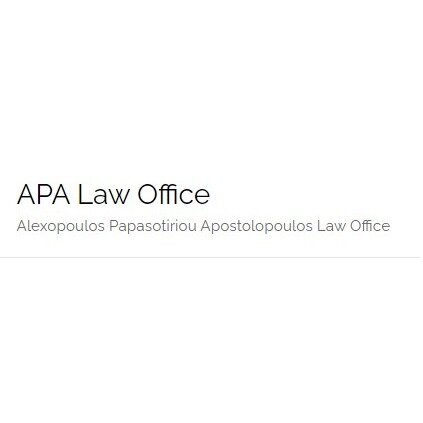Best Education Law Lawyers in Greece
Share your needs with us, get contacted by law firms.
Free. Takes 2 min.
Or refine your search by selecting a city:
List of the best lawyers in Greece
About Education Law in Greece
Education Law in Greece encompasses a wide range of legal issues related to the provision, administration, and regulation of educational services. Governed primarily by the Ministry of Education and Religious Affairs, the legal framework ensures the right to education for all citizens, sets standards for educational institutions, and oversees issues related to school administration, curriculum, teacher qualifications, and student rights. Greece's education law also deals with private and public school operations, higher education institutions, and special education needs.
Why You May Need a Lawyer
There are various situations in which individuals and institutions might require legal assistance in the field of Education Law. Some common scenarios include:
- Conflicts or misunderstandings regarding education policy or school regulations.
- Discrimination or harassment cases within educational settings.
- Disputes over educational rights for students with disabilities or special needs.
- Legal issues faced by international students studying in Greece.
- Concerns about the accreditation and status of educational institutions.
- Employment disputes involving teachers and administrative personnel.
- Issues related to student assessments, grading disputes, or disciplinary actions.
In these situations, a lawyer specializing in Education Law can help navigate complex legal frameworks, mediate disputes, and represent clients in court if necessary.
Local Laws Overview
Several key aspects of Greek educational law are particularly relevant:
- Compulsory Education: Education is mandatory for children ages 6 to 15. The law specifies standards for both public and private education sectors.
- Higher Education: Regulated by law, Greek universities and technical institutions operate independently but within the frameworks set by governmental decrees.
- Student Rights: The law safeguards students against discrimination and ensures equal access to educational resources.
- Special Education: Greek law guarantees support and accommodations for students with disabilities or special needs across all educational levels.
- Teacher Qualifications: Strict guidelines are in place regarding the qualifications and continuous professional development of educators.
These laws ensure educational services are equitable, inclusive, and adhere to set standards of quality.
Frequently Asked Questions
What is the age range for compulsory education in Greece?
Children in Greece are required to attend school from ages 6 to 15.
How are private schools regulated in Greece?
Private schools are subject to government approval and must fulfill specific criteria regarding staffing, facilities, and curriculum, aligning with national educational standards.
What rights do students have if they experience discrimination at school?
Students can report discrimination to school authorities, seek assistance from educational ombudsmen, or pursue legal action if necessary, supported by anti-discrimination laws.
Can foreign educational qualifications be recognized in Greece?
Yes, foreign qualifications can be recognized, but the process usually involves the Hellenic National Academic Recognition Information Centre (NARIC) to ensure compatibility with Greek standards.
What support is available for students with disabilities?
Students with disabilities are entitled to special education services, including tailored educational programs, specialized staff, and adapted learning materials.
Are Greek universities subject to Ministry oversight?
While Greek universities enjoy academic freedom, their operations, funding, and accreditation remain under the oversight of the Ministry of Education and Religious Affairs.
What recourse do parents have if they disagree with school policies?
Parents can raise complaints with school management, have discussions with school boards, or escalate the matter to local educational authorities or seek legal advice.
How are teacher employment rights protected?
Teachers' employment rights are protected by labor laws which cover contracts, working conditions, and dispute resolutions, supported by teachers' unions.
What are the typical grounds for expulsion or suspension of a student?
Grounds for expulsion or suspension typically include severe misconduct, repeated rule violations, or criminal activity, following due process and fair hearings.
How is educational technology integration regulated?
The use of educational technology is encouraged within a framework that respects privacy and data protection laws, ensuring it enhances learning outcomes without compromising student security.
Additional Resources
For further information or assistance, individuals can turn to:
- The Ministry of Education and Religious Affairs, which sets and oversees educational policies.
- Hellenic National Academic Recognition Information Centre (NARIC) for educational credential evaluations.
- Local educational directorates that handle regional educational matters.
- Educational ombudsman and legal advisory offices in schools and universities.
- Non-governmental organizations focusing on educational access and rights.
Next Steps
If you require legal assistance in Education Law, consider the following steps:
- Collect all relevant documents and information regarding your educational issue.
- Consult with educational institutions' legal advisors for initial guidance.
- Seek referrals for specialized Education Law attorneys or firms.
- Schedule consultations to discuss your specific case and potential courses of action.
- Consider alternative dispute resolution methods before pursuing litigation.
Always ensure that any legal advice or representation is from a qualified and experienced professional in Education Law.
Lawzana helps you find the best lawyers and law firms in Greece through a curated and pre-screened list of qualified legal professionals. Our platform offers rankings and detailed profiles of attorneys and law firms, allowing you to compare based on practice areas, including Education Law, experience, and client feedback.
Each profile includes a description of the firm's areas of practice, client reviews, team members and partners, year of establishment, spoken languages, office locations, contact information, social media presence, and any published articles or resources. Most firms on our platform speak English and are experienced in both local and international legal matters.
Get a quote from top-rated law firms in Greece — quickly, securely, and without unnecessary hassle.
Disclaimer:
The information provided on this page is for general informational purposes only and does not constitute legal advice. While we strive to ensure the accuracy and relevance of the content, legal information may change over time, and interpretations of the law can vary. You should always consult with a qualified legal professional for advice specific to your situation.
We disclaim all liability for actions taken or not taken based on the content of this page. If you believe any information is incorrect or outdated, please contact us, and we will review and update it where appropriate.
Browse education law law firms by city in Greece
Refine your search by selecting a city.
















